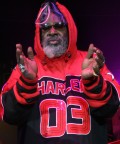U2 has been sued by British songwriter Paul Rose for allegedly stealing music from one of his songs for their 1991 album Achtung Baby.
Rose filed a lawsuit in Manhattan federal court on Monday (February 27) against the Irish band, Bono and bandmates the Edge, Adam Clayton and Larry Mullen Jr., and Island Records, claiming the group never acknowledged his part in creating The Fly or gave him a writer’s credit.
“Defendants have knowingly been exploiting The Fly without crediting Rose as a writer for more than 25 years,” the papers allege.
Rose, who is a successful musician in his own right with 12 records to his name, claims in the suit that he penned the tune, which he called Nae Slappin, in 1989 while living in England, and copyrighted it two years later.
He allegedly recorded the song as a demo in 1989 and then passed it to several senior executives at Island Records, where U2 were also signed in 1989.
According to the suit, the song was “played and repeatedly listened to in the Island Records office”, with U2 “often in the Island Records offices” as Bono and the Edge frequently used the company’s recording studios.
The group began recording Achtung Baby in 1990, with the record exploring “dance beats, distorted vocals and hard industrial edge sounded nothing like typical U2”, according to the suit. They released The Fly as the first single from the record on October 21, 1991, a month before they dropped the album.
Court papers claim that the guitar hook, the guitar solo and the percussion beats on The Fly are almost identical to those in Nae Slappin.
“The Fly copied and incorporated substantial, distinct, important and recognizable portions of Plaitiff’s work,” the papers state. “An ordinary lay observer would reasonably find that … infringement has occurred. Indeed, the similarities … are so strikingly similar that independent creation is precluded.”
There has been no indication as to why there has been around a 25-year delay in Rose filing his claim. However, the lawsuit notes that he has had no recourse as “the right of attribution is not statutorily recognized.”
He is seeking $5 million (£4 million) in damages as well as attorney fees.


















